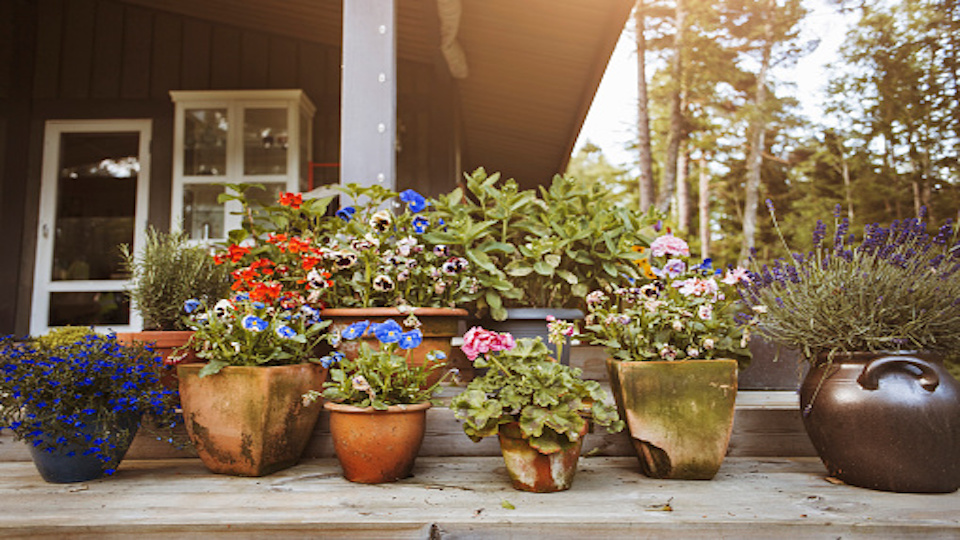Container gardens can be used to liven up any patio, grow a vegetable garden in a restricted space, bring color to your backyard, or keep your fresh herbs in easy reach.
This method allows even the most urban gardener to have a healthy, vibrant, green-living space. All you need is a patch of sunlight and some pots. Here are a few tips to ensure that your container garden is absolutely fabulous!
Plant what brings you joy
Individuality is key when it comes to container gardening. You have the perfect opportunity to try new things and express your personality with your plants. Don’t be afraid to experiment and figure out what message you want your garden to communicate.
Select the correct pot
Some things to take into consideration when selecting pots for your container garden include size, shape, and material. It is essential that you purchase a container large enough to accommodate the fully-grown version of your plant. This is your opportunity to choose a pot with a unique shape and color that will complement your porch or patio decor.
Don’t be afraid to be a little adventurous and select bold colors to add an exciting accent to your outdoor living space. Keep in mind, you don’t have to stick with traditional pots. Try planting in old barrels, watering cans, or even antique suitcases.
Drainage is extremely important
Be sure that you only use containers with appropriate drainage as one of the quickest ways to kill your plants is to leave them in sitting water. Sometimes, the small holes in pots are not enough and you will have to drill or puncture new drainage holes. Try lining the bottom of your pot with pine bark to help prevent waterlogging. Rocks serve this purpose as well but can weigh down your planters and decrease portability.
Quality soil counts
Traditional garden soil is too heavy for container gardening and can often compact roots and cause molding. Fill your pots with a quality, pre-mixed potting mix or make your own with equal parts perlite, compost, topsoil, and sand. This will also ensure appropriate nutrients that help feed your plants.
Plants in containers are thirsty
As with any type of gardening, it can be tricky to gauge how much to water your containers. Of course, there is some variation depending on the plant variety, temperature, and amount of sunlight your plants receive. A good way to gauge the general moisture needs of your plants is to stick your finger at least an inch into the soil and if it is damp, then it is adequately hydrated.
If the soil is dry or flaky, give your plant a good drink. Also, always water in the morning, as plants need the most water during the hot daytime hours. Be sure not to water the leaves or flowers, and instead keep the watering can towards the base of the plant.
Choose healthy plants to start
Though it is possible to start container gardening from seed, you will usually have more success if you invest in healthy plants. Mature plants will usually thrive after a transplant and are easier to care for than delicate seedlings. You can also try starting seeds indoors in a protected environment and then transplanting to outdoor pots.
Bring your pots indoors
Container gardening isn’t limited to the great outdoors. If you have inadequate space outside, or simply want to fill your home with healthy, living decor, try bringing your vegetables, herbs, and even flowers indoors. This is also a great option to extend the growing season of your plants and keep them vibrant all year long.
Feed potted plants regularly
Generally speaking, plants in pots require more fertilizer than those directly in the ground as they do not have the same worms and insects that provide essential nutrients. Follow fertilizer directions according to the plant information a few times each season.
Plants that do well in containers
These are just a few examples of plants that do well when grown in containers. Of course, the list is not exhaustive, and any plant can be part of your container garden with the proper pot and care.
Vegetables:
- Radish
- Tomatoes
- Spinach
- Lettuce
Flowers:
- Daffodils
- Daisies
- Sunflowers
- Marigold
Herbs:
- Mint
- Basil
- Rosemary
- Thyme
What tips do you have for container gardening? Let us know in the comments below!
-Taylor Ramsey




